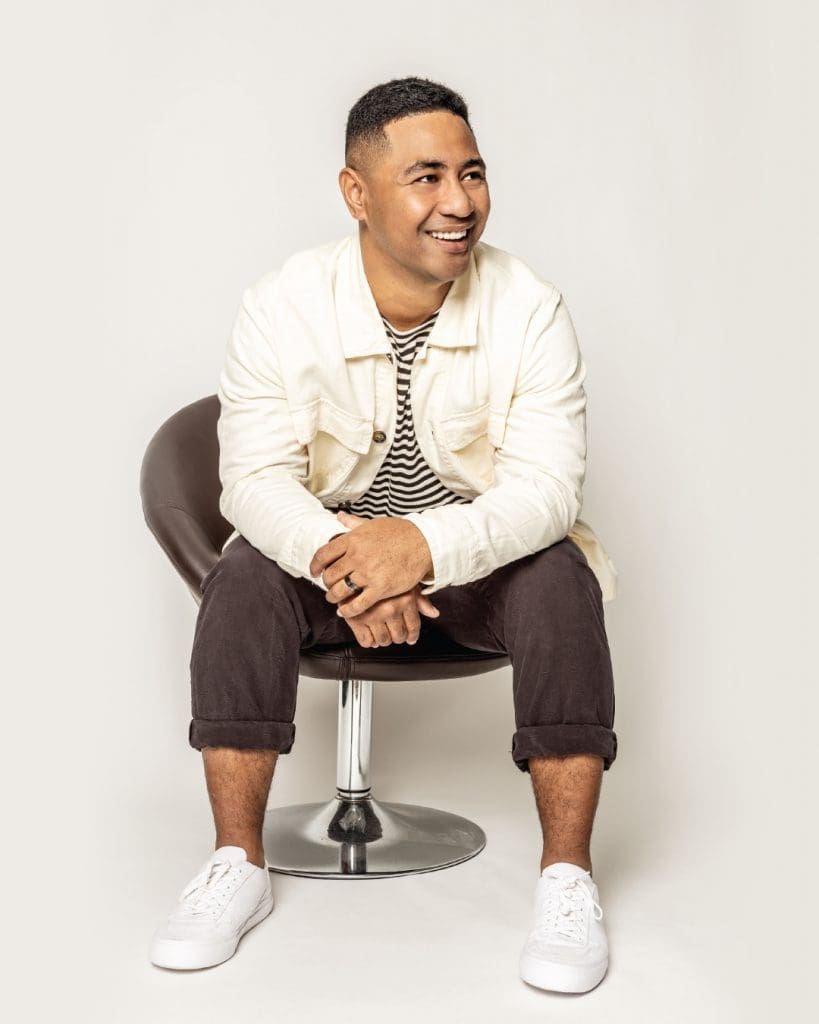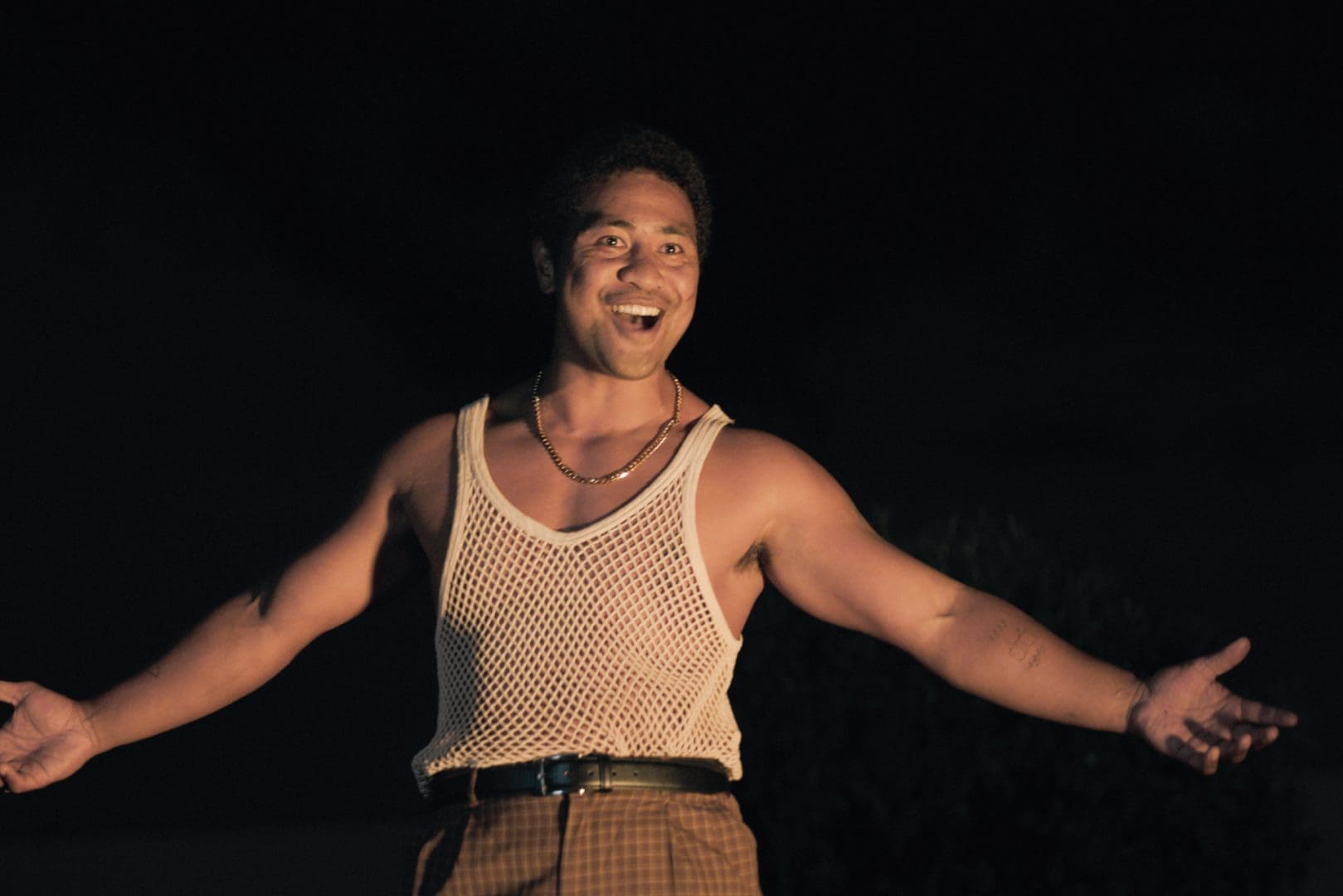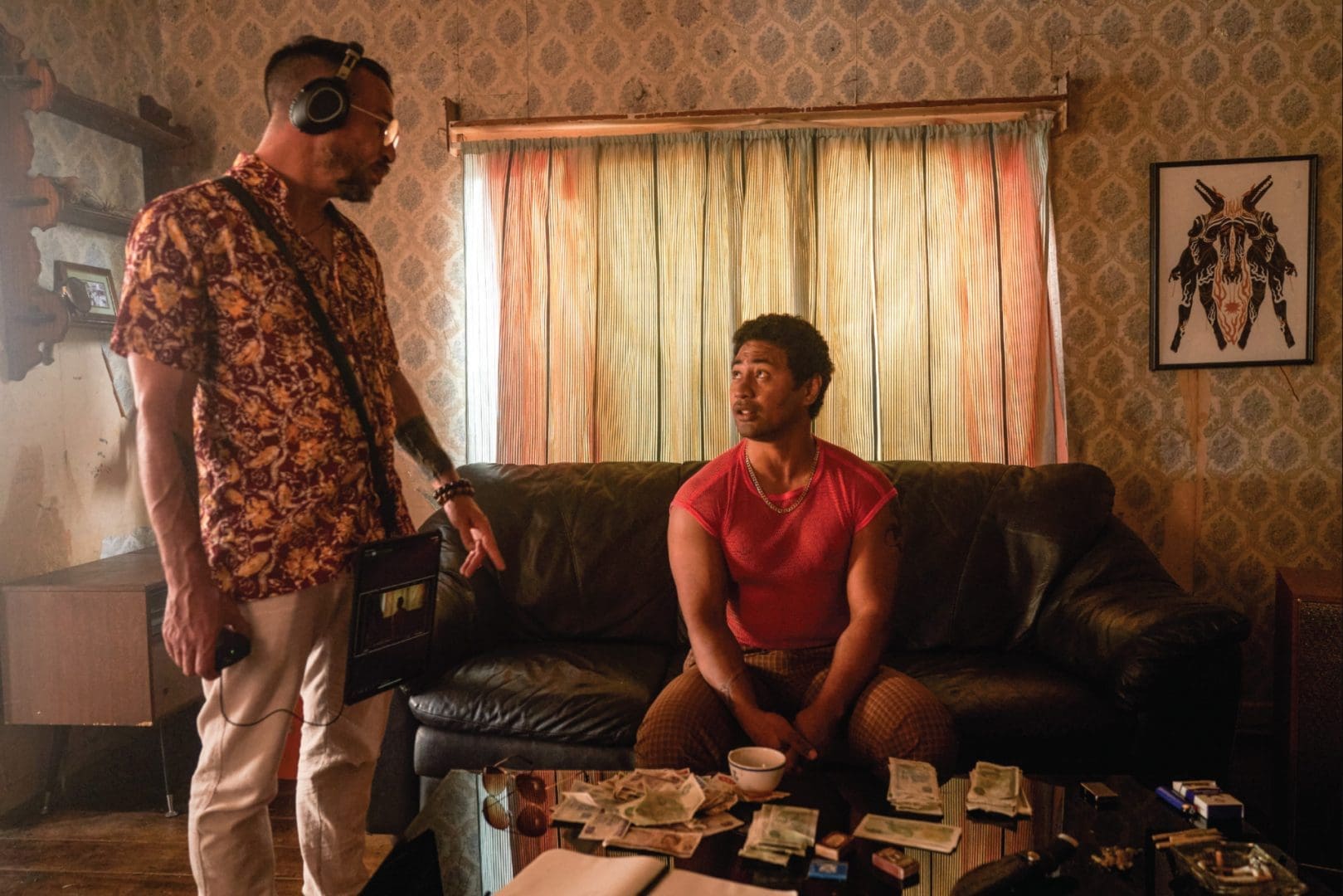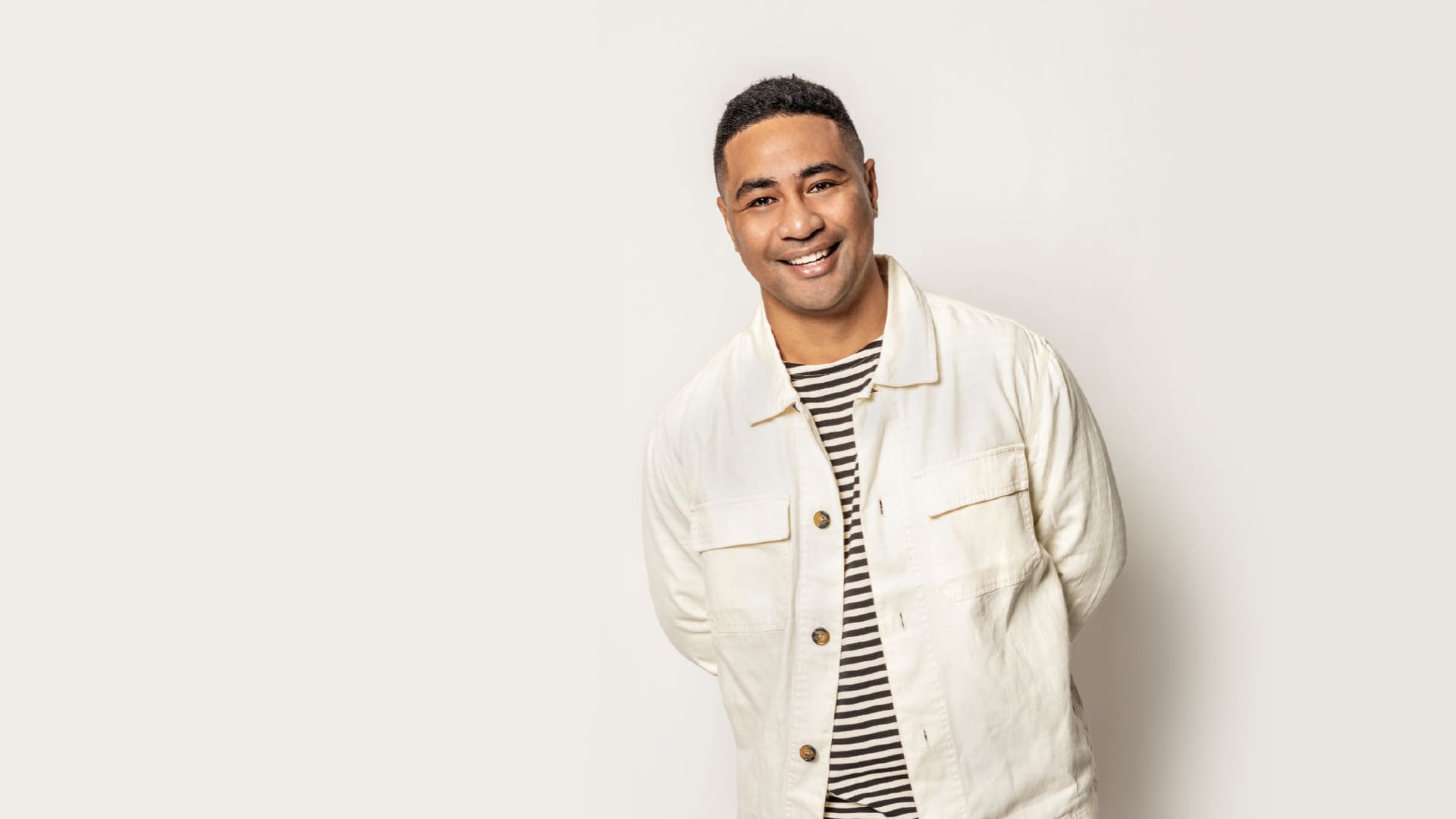A New Dawn
New Zealand acting superstar, Beulah Koale has had a meteoric rise over the last few years, appearing in the likes of The Last Saint, Hawaii Five-0, Magnum P.I., Thank You for Your Service, and Shadow in the Cloud. and while his Hollywood roles are lining up, he put everything on hold to come back home to work on The Panthers, a deeply personal project about the 1970’s dawn raids, racism against our Pacific Island community and the group that rose up against it. Beulah gives us his tips for surviving in Hollywood and the power in making a leap into doing what you love.

Before we sat down for the interview, you were talking about hanging out with the likes of Mark Wahlberg. You’ve become a part of this world. You become a part of this kind of level of celebrity, right?
Yeah, I guess you could look at it like that. Once you’re into the acting world and Hollywood, it becomes a very small world. It’s so weird just knowing, these are the people I used on watching movies and now I’ve met a whole bunch of them. It’s weird. It’s its own little world. I try to just make sure I am who I am.
Do you sometimes have trouble reconciling Hollywood with the down to earth New Zealand world?
I’m pretty lucky because I’m very driven. So I know how to get to the goal where I want to get to. I’ve already set up in my head the traps that I shouldn’t fall for. It’s really simple for me.
I always tell myself, don’t ever get stuck in the glitz and glamour of this world because it’s very glitzy and glamorous. It’s a job at the end of the day. The celebrity stuff is just a part of it. It’s not what I signed up for, I signed up to act.
One of my biggest inspirations is Denzel Washington, because of his acting, but also because of what he says off-screen. He just does the job. Robert de Niro is the same, he just does the job.
Was this stuff you had to learn on the go? Because your career has had a certain momentum about it.
Yeah. It’s definitely something that I had to just learn on the go. And not just through this industry as well, I feel like I learned it through life, growing up as a kid. I feel like the lessons that I learned as a kid apply a million percent to the industry I’m in now.
Just following the right people, learning from the mistakes of other people and just setting a goal and chasing it. It’s pretty simple when you think about it in those terms.
I know what you’re talking about is really quite relevant to this world of celebrity but it’s probably relevant for a whole lot of careers and a whole lot of people in different situations.
Social media or the digital world has changed the game. There’s backing for it because you can get money from it, but that’s not my thing. I’m not going to be the social media celebrity guy. I’m the guy that stays at home, kind of like Cliff Curtis. He just does the work. I’m just the guy that does the work and lets his actions speak for him, rather than going out promoting it.
A lot of what you’re talking about really seems to stem from your upbringing. Have you got any parental advice for how you can prepare your children for a future where social media and those potential trappings are probably going to be even more prevalent?
I’m a parent myself, I’ve got two boys. I’m still trying to figure it out, but one of the biggest things that I take is knowing who I am is the most important thing in the world. Knowing there’s only one me, no one else can be me, just figure out who you are.
So for my kids, I want to raise them and help them to figure out who they are. That’s all you need to do in this world; don’t try and fall into the traps when you go away from that.
It’s the same thing with acting. As an actor, this role that I’m playing in The Panthers is the total opposite of me. I could have attempted this role and be like, ‘Let me make up something and try and be like The Joker’ or whatever. I was just like, ‘No, let’s take an aspect of my life that fits this guy and use the real, use who I am, Beulah, into this character’. Even though it’s the complete opposite of who I am as a person, he is me. He’s this tiny bit of me that I just put in a pot.

Your character in The Panthers really is a bundle of intense anger. How do you tap into that?
Life, I tap into that. Every character I try and do, a character that deserves it, I use aspects of my life. There’s darkness in this character that I pull from my life, from music as well and then I add into it the research that I’ve done. This is how I tackle most characters.
I just grabbed this big pot, the biggest chunk of ingredient is my life, I add a little bit of research, a sprinkle of music and then I just mix it up and I’m like, ‘All right, let’s drink this potion and see what happens’. And commit to that because it’s easy to say it, but it’s really, really hard to do. This guy, he messed me up a little bit, in real life.
When you’re pulling out a part of yourself to go into a character, does that start to influence your personality in real life?
A million percent and I’ve done this with maybe three jobs now. The first one was my first one with Dreamworks. That one messed me up for months, I was playing a soldier with PTSD. With this one, it was the same, he messed me up for a while.
I needed a good support system, which is my wife, to keep me in check. But I was strong enough and had the tools to be like, ‘Okay, I can pull myself out of these situations’. Because basically what you’re doing is taking out the skeletons in your life and revealing them and having them on set with everyone.
Do you find with the Dreamworks film and with The Panthers, that there is an aspect of the work that you do that allows us to look back and reveal the skeletons within our own history as well? Many kids today aren’t even aware of the Dawn Raids.
Oh yeah, a million percent. I didn’t really know much about the Dawn Raids, until I jumped into the project. I was taught it, but I didn’t really know how serious it was, until I jumped in the project and had done a whole bunch of research.
I did a lot of my research after I came back from Finland and I was in MIQ. I was in that room, that’s when I started researching everything about the Dawn Raids and I was shocked that I wasn’t taught this properly. I was taught it, but on a very surface level and it hurt me that I didn’t know that this had happened to my people and my country. It hurt that New Zealand was like that.
But this is why I wanted to do this project because this is a project that is not about me, it’s about the people before us and the challenges New Zealand as a country faced back then. To see how far we’ve come and to fight for my people.
Why do you think it was, because 1974 is not exactly that long ago?
That’s a generation ago. That was my uncle and aunty. I went and asked them, ‘This happened to you guys?’ The new generation are very ‘woke’ about it. But then I go and ask the people who were actually in that, getting raided, and my aunty and uncle were just matter of fact about it, like ‘Yeah, it happened’.
I was almost angry at them and I was like, ‘It happened? It needs to be a bigger reaction, why aren’t you angry about it?’. But they’re in that mentality of being stuck there. They had no choice. I guess when you’ve just been beaten down mentally, some people physically, you just become part of it. I don’t know, maybe they’re just numb to it all.
Do you think with a project like this, that it will educate the new generation and that will have this ripple effect?
In New Zealand, we probably properly didn’t teach the Dawn Raids to everyone like myself and everyone who I know in my community out in South Auckland. So this is a tool where kids are going to watch it to be entertained, but be educated at the same time. And then go to Google and search out what happened. And then watch the videos that I watched that made me angry and be like, ‘Why was I never taught this?’
I hope it is going to educate everyone. I hope people know what happened in this country. It would definitely have a ripple effect, but we have to be careful with that as well, because that type of energy and that type of darkness can go into a very dark place very quickly.
As a country, I feel like we just need to be careful of that. We need to be aware and just look where we are right now as a country. The first thing, and I know this from my own experiences, I’ve jumped straight to anger straight away. I just needed to calm down for a second and just let it sit and then just look at it.
When you look at your career, it’s a huge source of inspiration for new generations. Do you feel that pressure on your shoulders as well?
Yeah, that’s why I came back to do this. I wanted to honour the past and be the next generation that’s going to inspire the next ‘me’. I never wanted to miss out. For this role, when I heard it got greenlit, I called Tom [Hern, creator] from Montana and it was just like ‘I heard you got greenlit, I’m going to fly there. Just tell me when it is’. And I pretty much forced him to cast me.
Going through your IMDB page, there’s a lot of big projects, but there’s something about this project that seems really personal.
Yeah, very personal. I had to argue with my team for it. I have a team in America and here in New Zealand, and I had to argue with them; ‘I’m flying back to New Zealand and we’re blocking out this amount of time and we’re not going to look at any other jobs for this time’.
For a working actor in the States, you could potentially be losing a lot of money. But it’s not about that, I want to be a part of this. This is legacy work, where you get to put this one down and this would be added to my legacy when I’m done. This is not a money job. This is for my people. It was very personal.

Do you get the sense that there is this shift as well? you talk about this project and the opportunity costs of a Hollywood project, but do you feel like there is more and more audience demand for for indigenous stories?
Yeah, there is now, but there’s still not enough. I know the world is leaning towards the space of telling more indigenous stories and that’s great, but I just hope it just keeps moving in that direction because those are all the tough stories to tell.
We could keep telling stories about superheroes all we want, but sometimes we as people just need to face the truth to move forward. With this project, I hope people don’t turn to anger. I hope they turn to, ‘Okay, that’s where we were. How can we not let that ever happen again?’ Attack it with love instead of anger.
Do you ever have a sliding doors moment and wonder what happens if you didn’t pluck up the courage to go into that first acting lesson?
Yeah, man. Probably twice every month, I always think about that. What if I didn’t go back to that acting class? What if I just stayed out and just ate my cream doughnut and then went home, my whole life would be different. I’d be just a normal guy in South Auckland. I would probably just be working normal jobs.
But yeah, it scares me. That thought scares me a lot. I guess that’s why I moved so far in my career. I always think about my deathbed. That’s something I always try and tell my friends as well, just make the decision. Because you never want to be on that deathbed and say, ‘What if I didn’t give it a go? What if I didn’t take that cream doughnut and just walked back into the room and just attacked the decision?’
It scares me, but it’s what helps me push forward to where I need to go. It helps me believe that I can make my dream come true, which I have, but I can it push further.
Any other advice that you’d give to people, regardless of what situation they’re in, where they know there’s something else out there and they just have to take that leap of faith?
Yeah, in terms of that, it’s a decision. I feel like people try to make it something bigger than it is. It’s not, it’s literally a choice. It’s, ‘Do I do it? Yes or no’. Don’t think about the repercussions. Don’t think about not having a weekly income. Just make the choice and chase it because that’s how simple it is.
That’s how simple it is to change your life and chase your dreams. And trust me, you would rather be making not that much money and chasing your dreams, over making a fair bit of money doing something that you don’t even want to do.
I learned that for a long time and it started over here in New Zealand. I’ve done a whole bunch of acting jobs or whatever for minimum wage, some jobs were done for free just for the experience because I loved it. I loved it, I was never unhappy. But now I get to reap the rewards of chasing the dream. It just takes longer, invest in yourself.

